#Attitude UK
Text
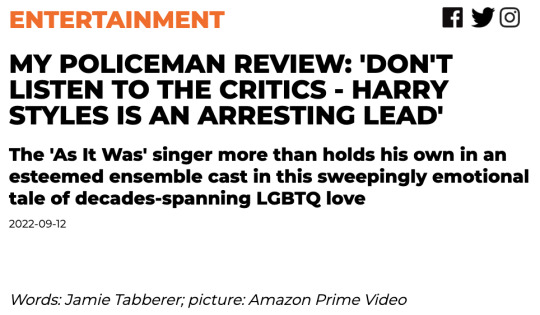
Summary: 4 out of 5 stars.
Styles didn’t deserve the nastiness he got then, and he doesn’t deserve smart-alecy comments now, as reviews emerge from last night’s Toronto Film Festival premiere. Attitude saw Policeman a few months ago, and were struck by the irresistible charm of Styles’ impressive, finely-judged take on tortured bisexuality. This is categorically not a Mariah Carey-in-Glitter moment. And for this viewer, at least, Styles' past statements about his own sexuality lend the performance texture; an air of gutsiness.
But enough about him. The is an equally weighted ensemble cast, of which Emma Corrin is the other A-list casting. They deserve huge praise for their delicate and haunting turn as Tom’s betrayed wife, Marion, pouring forth numerous subtle expressions that speak a thousand words, as deployed with such stealth on The Crown. Corrin’s Marion is all simplicity and commonality - frustrated spouses across the country will relate - and worlds apart from their bold public persona. (The same goes for Styles.)
The lesser-known David Dawson, with his mournful eyes and crisp, clipped accent, is meanwhile a heartbreaking revelation, while the indomitable Gina McKee, as the older Marion, is the ace up Policeman's sleeve, portraying a gentle, unassuming everywoman finally deciding to act on a lifetime of disappointment and regret, but via sad stoicism rather than a dramatic reckoning. Rupert Everett and Linus Roache - as the older Patrick and Tom, respectively - are similarly restrained and impeccable.
Perhaps too restrained. My Policeman’s main flaw is not giving this distinguished trio enough to do. Particularly Everett, who's overdue a ‘big’ acting moment, but whose work here is quietly moving.
Indeed, under Grandage’s elegant, unfussy direction, this take on Bethen Roberts’ 2012 novel is understated to a fault. (“Your standard, polished ITV drama,” as one friend of Attitude puts it.) It’s certainly not the vehicle for exhibition one might have expected from Styles’ first lead outing, and was never going to attract the kind of drama Don't Worry Darling is getting. In some ways, it's kind of random that it exists, but we're not complaining.
Besides, many will appreciate its anti-soap opera tone, nevertheless sweepingly emotional by the end, and recognise that, despite boasting two of the most fascinating stars of their generation, My Policeman is, quite decisively, a stripped-back film about everyday people. It’s a curious thing to see Corrin and Styles pull that off.
The latter’s involvement, furthermore, will doubtless teach millions of youngsters valuable LGBTQ history lessons; people who otherwise might scroll by such sober content. (Homosexuality was partially decriminalised in 1967, FYI)
If the film itself needs more bang, the sex scenes, at least, pop: they're as tender and tasteful as they are strong and daring, with Dawson and Styles throwing themselves in with gusto. They have such different energies that, on paper, you'd bet against them having chemistry. But on-screen, it works. There’s mesmeric energy between all three leads, in fact: so much so, that one wonders if screenwriter Ron Nyswaner considered embellishing the lean plot to include a ménage à trois storyline, which might have helped Policeman break more ground in what it has to say about sex and sexuality.
Attitude UK review by Jamie Tabberer - not full review, read here (spoilers).
[where are these critics getting bisexuality from? Tom is a closeted gay man!]
89 notes
·
View notes
Photo


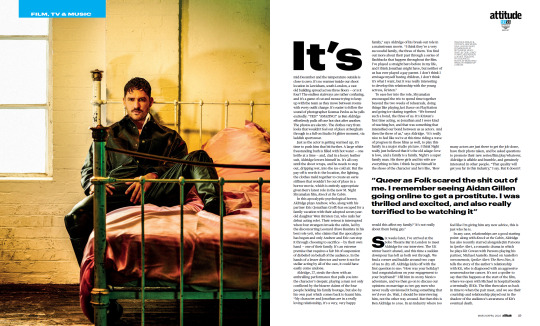
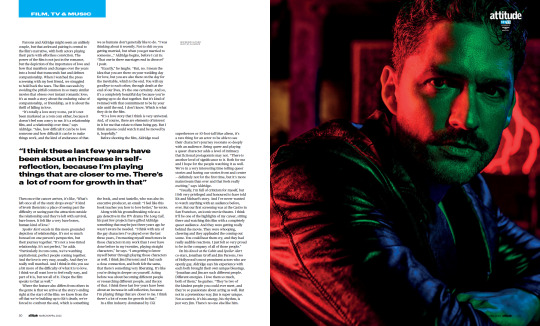

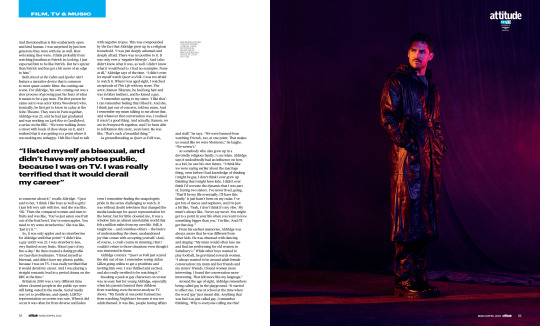

Ben Aldridge - Attitude Magazine [March / April 2023]
Photography by Kosmas Pavlos
#Attitude#Attitude Magazine#Photoshoot#Kosmas Pavlos#Attitude UK#British#Hairy Chest#Ben Aldridge#Fleabag#Our Girl#Pennyworth#Spoiler Alert#Spoiler Alert Movie#Knock at the Cabin#Captain Charles James#Thomas Wayne
0 notes
Text

The Clash in a New York taxicab , 1982 .
©️ Dave Hogan/Hulton Archive/Getty Images
#paul simonon#terry chimes#joe strummer#mickjones#the clash#punk boy#80s punk#70s punk#uk punk#punk rock#new wave#post punk#experimental rock#reggae#dub#funk#ska#rockabilly#punk aesthetic#the only band that matters#black and white photography#punk attitude#new york#1982#dave hogan#hulton archive#getty images
272 notes
·
View notes
Text

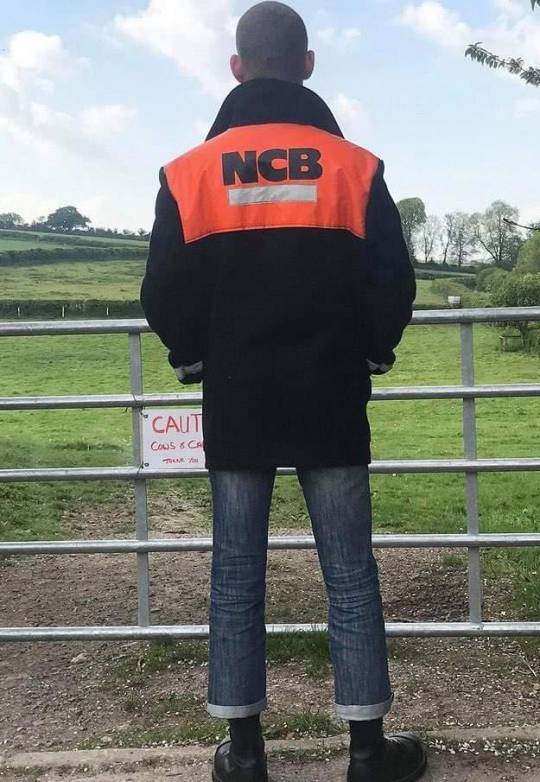
88 notes
·
View notes
Text
The tide is turning and the TQ+ only have themselves to blame
Brits are turning against gender ideology
Ordinary people are swiftly waking up to the threat posed by 'trans rights'.
JO BARTOSCH. 30th September 2023
In news that has left members of the dinner-party set spluttering over their decolonised soya lattes, it turns out the great British public isn’t as bigoted as they fantasised. Published last week, the latest British Attitudes Survey (BAS) has shown that Brits are increasingly tolerant of same-sex relationships and ever-more accepting of sex before marriage or abortion.
But perhaps most tellingly, as attitudes toward sexual morality have become more liberal, attitudes toward transgenderism have become far less sympathetic. The survey shows that the proportion of people who think someone should be able to change the sex on their birth certificate if they want has fallen from 53 per cent in 2019 to 30 per cent today. The proportion of people who ‘describe themselves as not prejudiced at all against people who are transgender’ has also declined from 82 per cent in 2019 to 64 per cent today.
That particular statistic has been taken to mean that there is a rising tide of ‘transphobic’ bigotry. But I see no trace of that in the gender debate or in broader society. More likely, these stats capture the public’s growing concern about policies and ideas associated with transgender ideology, from the erosion of women’s rights to children’s safety.
Predictably, this change in attitudes has been condemned by those who have built their careers on the grievance politics of trans activism. Former Stonewall CEO Nancy Kelley opined on X (formerly Twitter) that ‘years of relentless toxic coverage and political manipulation is making us less tolerant and less supportive of a marginalised community’.
Kelley is just wrong. This attitudinal shift is not prompted by ‘toxic’ reporting or ‘political manipulation’. It’s actually prompted by a greater understanding of ‘transgender issues’. And here Kelley is correct – news coverage has made a difference. It has made us aware of what the cause of trans rights actually entails.
So, as stories like that of double rapist Adam Graham (aka Isla Bryson), a man who was put in a women’s prison, have received column inches in the British press, public opinion has begun to shift. Furthermore, in the face of obvious injustices, such as men triumphing in women’s sporting competitions and winning female-only awards, accusations of ‘transphobia’ have lost their power to silence would-be dissenters. The public is gradually waking up to the reality of transgender ideology and they don’t like it.
Gillian Prior, deputy chief executive at the National Centre for Social Research, which produces the BAS, disagrees. She seems to think the public’s turn against trans rights is evidence of our growing illiberalism. ‘In the case of transgender people’, she said, ‘the recent public debate about the law on gender recognition has appeared to have resulted in attitudes becoming less liberal than they were just a few years ago’. But this completely misunderstands the issues. There is nothing illiberal about not wanting women to give up hard-earned rights and spaces to accommodate the feelings of men who identify as trans.
In fact, the survey shows just how liberal Britain is now. The change in attitudes toward homosexuality has been remarkable and encouraging for those who believe in equality. Over the past 40 years, the proportion of those who think that same-sex relations were ‘always wrong’ has fallen from 50 per cent to just nine per cent.
The cause of LGB rights is very different to that of ‘trans rights’. Gay liberation was a fight to achieve legal parity with heterosexuals. The fight for trans rights is not about fairness or legal parity. It’s about allowing children to be put on experimental, puberty-blocking drugs, advocating for taxpayer-funded cosmetic surgery and, above all, demanding that the rights of other groups, especially women, are infringed upon.
These illiberal and dangerous demands have been pushed by trans activists, not those advocating for LGB rights. As Kate Barker, chief executive officer of LGB Alliance, the only charity advocating exclusively for same-sex attracted people, explains, the battle for equality for gay and lesbian people has largely been won. If there is a growing threat to gay and lesbian rights today, it comes precisely from trans activists.
‘Today, gay men and lesbians are being branded as discriminatory bigots for being attracted exclusively to one sex, their own’, says Barker. ‘This is the result of gender-identity ideology, which promotes the belief that it is valid for some men to “identify” as women and vice versa. Believers in this ideology say it’s “transphobic” for lesbians to rule out all males who “identify as lesbians” as potential sexual partners. It is a bizarre reversal of the prejudice we faced in the Seventies and Eighties.’
So, despite the howls of protestation from trans activists, Britons are not becoming more intolerant. Rather, they are waking up and saying no to an ideology that threatens us all.
Jo Bartosch is a journalist campaigning for the rights of women and girls.
#UK#The British#British Attitudes Survey (BAS)#Years of toxic coverage? No Nancy Kelley it's simply coverage of predators in the TQ+ and how the community downplayed their crimes
107 notes
·
View notes
Text
Not only do I have the sea 🌊 ⛵ right on my doorstep ...... But also the Rock Gardens. A place to sit outside n peace and quiet 🙏🙏🌊⛵🌱🪴💚
#positive mental attitude#positive#positive thoughts#bemindful#be healthy#mindfulness#selfcare#rock garden#nature#uk
24 notes
·
View notes
Text
Harry in ep9: I need to back down a bit so I don't get attention on me
Harry throughout all of ep10:

#he is nottttttt winning with that smug attitude#so much of what I adores him for is gone 🥲#he's so smug that he's entirely unaware of everything around him#he gotta calm down and back down a bit or he's getting caught#the traitors#the traitors uk#quote is paraphrased but he said he was gonna back down and be careful#this is not being careful Harry Clarke#this is what we call a Paul or Wilfred
29 notes
·
View notes
Text
So I got a response from my MP about the genocide in Gaza yesterday.
Some context; my MP is Tobias Ellwood, who is largely known for two things; being the Parliamentary Under Secretary of State for the Middle East (this will be relevant later) and trying to save a policeman's life during an attack on Westminster. More recently though, he's been better known for trying to reintroduce conscription, describing his £90,000 salary as 'counting the pennies', running over a neighbour's cat, and trying to ban protests at his home.
Under increasing pressure, he sent out a generalised email yesterday in response to people calling for a ceasefire and well...
...
Thank you for your email, I have received a large volume of correspondences on this matter and hope my response can set out my position in more detail.
Firstly, you are right to highlight the appalling situation in Gaza caused by the Israeli Prime Minister’s cack-handed and ill thought out invasion. Hamas has lost its right to represent the people of Gaza – but this is not the way towards securing a two state solution. It has simply led to escalation.
I warned Israel (after the barbaric attacks on the 7th October but BEFORE the IDF tanks rolled in) NOT to invade until there was a clear plan of governance and security for which any military operation can work towards that minimised the danger to innocent lives and ensured the removal of Hamas.
I even wrote a plan that might be considered – published in Politico which I invite you to read:
https://www.politico.eu/article/israel-gaza-hamas-uk-benjamin-netanyahu-we-need-a-plan/
The scale of collateral damage is shocking, and I’m pleased international voices (including the UK) are getting louder in criticising Israel. But the only country with the ability to alter Israel’s behaviour is the United States, and behind the scenes they are making their views heard but more needs to be done.
On the question of arms sales, I’ve asked for more information on what is being sold. The call to block all arms sales is understandable – but it could have wider economic consequences. Licences are valued at £500m versus overall trade with Israel (including many businesses from Dorset) worth £9bn. Would such action in cutting arms sale alter Netanyahu’s behaviour? Or would we lose precious leverage in speaking and influencing privately?
Away from Netanyahu’s appalling response - Israel is an important UK ally and rare democratic state in a troubled part of the world. It requires wise decision making to leverage our influence efficiently.
I’d prefer to see consideration of halting specific military exports IF they are involved with IDF’s operations in Gaza. I am seeking clarity in what that is from my relevant ministerial colleagues.
UK funding for UNWRA has NOT been cut. I have checked with the Minister and there was a question raised about FUTURE funding – but right now there is no question of programmes stopping because UK money has been switched off. I have made my views clear. The speed in which threats to turn off future funding were made was ill-considered. Over 13,000 UNRWA staff work in Gaza. Involvement by a dozen with HAMAS (now being investigated by the UN Chief) should not jeopardise the critical work of the most senior UN agency working in such desperate conditions.
Finally, the call for an immediate and permanent ceasefire. Yes, I would like to support this. It’s where this terrible conflict must eventually go. But having been involved in a few cease fires, whilst serving in the British Army, could I spell out some issues which must be in place at the same time.
Cease fires are not something you shout from afar and they just happen.
A Cease fire is the title to a list of agreements BOTH sides have signed up to - that results in a cessation of fighting in order to give space for other activities to take place.
If BOTH warring parties do not support a cease fire (and conditions) – but are intent on continuing the fighting it will not happen. Both HAMAS and Israel are at present intent to keep fighting.
Fighting can be stopped by a third party/force which marches in the separate sides and enforce the peace. I suspect this is NOT what you are calling for.
The details of any ceasefire are almost always arbitrated by a third party / parties. And usually come after a number of rounds of discussions. Such discussions are happening in Egypt and Qatar – but to date little progress has been made.
Details of any ceasefire will include:
Time frames of commencement of ceasefire.
3rd party monitoring teams (UK might play a role here).
No fly zones, buffer zones, humanitarian corridors
Emergency procedures to quash any breaches by individuals seeking to see the ceasefire fail.
agreed incentives to help the cease fire last (outside funding/ hostage release /humanitarian support infrastructure repair) for activities to take place to build trust.
6. All the above supported by an international legal framework – usually in the form of a UN resolution.
7. Agreement on round table discussions to discuss the long term solutions.
As you can see a ‘cease fire’ is simple to demand from afar – less simple to implement in practice. And easy to challenge Western governments about why one is not in place. It is worth remembering that such agreements are occasionally signed up to as opportunity for one side or both re-group and re-arm which is something we must be particularly weary of.
I hope, if you have read this far – you will appreciate the context of an Opposition party – calling for a vote on a ceasefire. Perhaps it’s an important political statement. But as I highlight above there are practical implications, which, if I am honest are not discussed in detail. The discussion then boils down to an over-simplistic binary position on supporting the people of Gaza without consideration of the magnitude of obstacles to overcome if a meaningful ceasefire was to be introduced. I so dislike such binary and divisive politics, yet right now that’s how the debate on Wednesday is shaping up. We should be better than this.
I will push for a cease fire in the context I’ve outlined above. I will think carefully how I will vote. If this is just about having another pop at the Government for political gain – I will probably stay away. The people of Gaza deserve better. I plan visit Rafah in the next couple of weeks.
Thanks again for getting in touch. I apologise about the long response. There is nothing simple about conflict and indeed ending it.
Kind regards,
Tobias
I just... I don't think I could write a more condescending, twisted or imperialist response if I tried. The bit about the not suspending arms deals, the 'explanation' of ceasefires/ cease fires, the grammatical and spelling errors. I've been trying to write a concise response for the last hour and I just can't. The only positive is that the growing pressure does seen to be getting to him.
There is another vote on a ceasefire today. Please keep pressuring your MPs. It is slow work but its getting there.
#uk politics#free palestine#free gaza#given that it was a copy paste response I think im okay to post it on here#and people should be aware of the attitude of british mps to this crisis
19 notes
·
View notes
Text


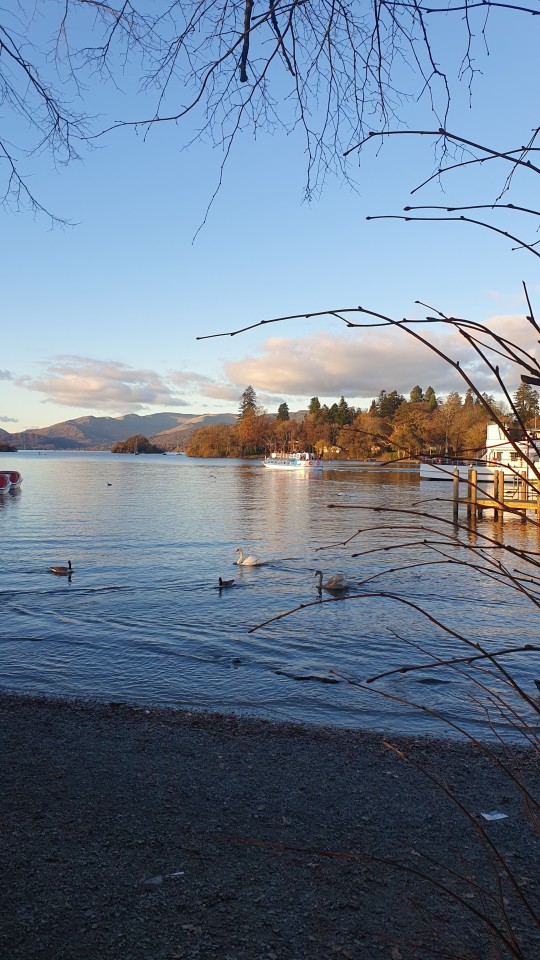

#mental health blog#positive mental attitude#autumn#fall#fall aesthetic#healing#love nature#landscape#lake#lake aesthetic#lakeside#uk#english countryside#english#enjoylife#autumn photography#autumn palette#fall photography#autumn leaves#autumn lover#autumn landscape
18 notes
·
View notes
Note
it is unfortunate that you can say you see a dogshit take by an american with 50k+ notes and that absolutely narrows nothing down whatsoever. for that i can only apologize 😔
well the original post was too long to screenshot succinctly and i didn't really want to put All That onto anyone's dash. doing us all a favour to be fair
#it was just this weird attitude that i keep seeing nowadays from americans in regards to british people thats like. We're Better Than You#which is indescribably stupid because then it becomes a pissing contest between two equally horrendous countries#from any other country i wouldn't bat an eyelid because they're probably right but it's just so funny coming from americans. like. say sike#(embarassingly) it was basically crowing about how appalling the wildlife situation is in the uk which is a real and complex issue#and i will save us all from the myriad tag essays i could write on this. but it was written from#an american perspective of 'we're so much better' which i find doubtful at best laughable at worst#it also frustrated me to ignore the huge number of charities and individuals in the uk who have been working so hard against the government#to rewild and reintroduce key species. is the woodland trust a joke to you??
7 notes
·
View notes
Text
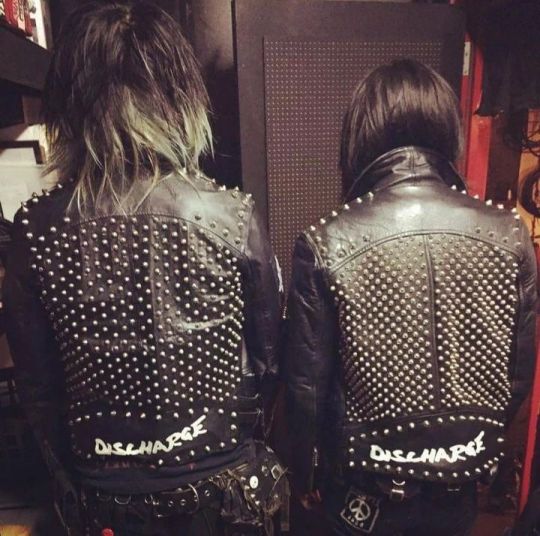
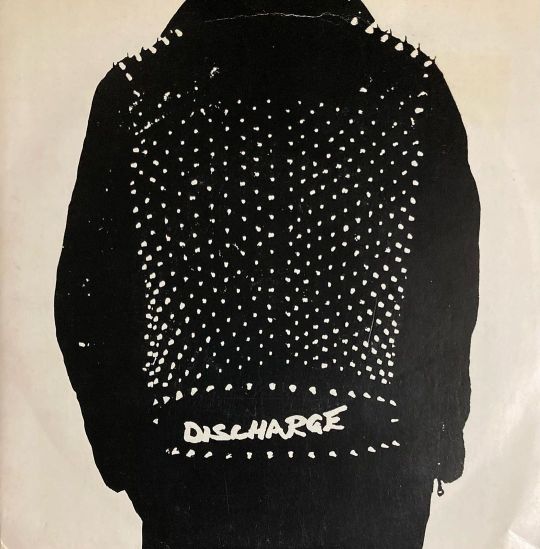
THE "REALITIES OF WAR" COME TO LIFE.
PIC(S) INFO: Spotlight on Japanese raw punk/crasher crust band CONTRAST ATTITUDE rocking matching DISCHARGE jackets, c. July 2023, paying homage to the classic Cal jacket (designed by Rainy) on the sleeve art for the scene-spawning 1980 "Realities of War" EP.
Dis nightmare still @$!*#&% continues!!
Source: www.picuki.com/media/3142549771164413167.
#CONTRAST ATTITUDE#DISCHARGE#CONTRAST ATTITUDE band#Raw punk#Japanese D-beat#Nuke Wave#UK punk#Realities of War#Realities of War 1980#Noise Not Music!#D-beat#80s hardcore#Studded Leather Jacket#Crasher Crust#Dis-punk#Apocalypse punk#Discore#D-beat Raw punk#ASPECTS OF WAR#Hardcore punk#ASPECTS OF WAR band#Second Wave UK punk#Leather Jacket#Realities of War EP#Studs and Leather#Apocalyptic Raw Assault#Sleeve Art#Japanese Crasher Crust#Crasher crust
7 notes
·
View notes
Text
*Four* Eurovision 2023 songs are currently sitting in the UK's Official Top Ten Singles Chart 🤯
They include Sweden (#2), the UK (#9), Norway (#10) and of course our boy Käärijä who made it to #6 - the first ever Finnish-language song to reach the Top 10 in the UK charts!
#the UK's attitude towards Eurovision has improved so much over the past couple of years#not a huge fan of the song but I'm so thrilled to see Mae doing well despite coming so low in the leaderboard#and of course seeing Käärijä in the Top 10 is amazing 🥹🥰#Käärijä#Loreen#Mae Muller#Alessandra Mele#Eurovision#esc#esc 2023
24 notes
·
View notes
Text
𝔇𝔢𝔢𝔭 𝔓𝔲𝔯𝔭𝔩𝔢 - 𝔅𝔞𝔡 𝔄𝔱𝔱𝔦𝔱𝔲𝔡𝔢
#Deep Purple#The House Of Blue Light#Bad Attitude#Release date:#January 12th#1987#Full-length#Genre:#Heavy Metal/Hard Rock#Themes:#Rock 'n' Roll#Love#Relationships#Life#Society#UK
17 notes
·
View notes
Text

Paul Simonon performs live at The Lyceum , London , England , October 18th , 1981 .
©️ Steve Rapport/Getty Images
#paul simonon#the clash#uk punk#punk aesthetic#punk boy#the only band that matters#punk rock#70s punk#80s punk#punk#punk music#punk attitude#bass player#black and white photography#chiaroscuro#the lyceum#london#england#1981#steve rapport#getty images
59 notes
·
View notes
Text

62 notes
·
View notes
Text
becoming a Cartwright stan account brb
#reblog if you know cartwright was a real one#it’s high camp and homophobic#so I’m obliged to do it now#the babygirlification of Cartwright begins#this is a joke!!! fuck Cartwright#he’s the personification of homophobia and conservatist attitudes/values and he’s a murderer by proxy like the uk gov post war soooo#I could write an essay on him#and his symbolism#even if it’s not that deep it is to me#bbc ghosts
4 notes
·
View notes